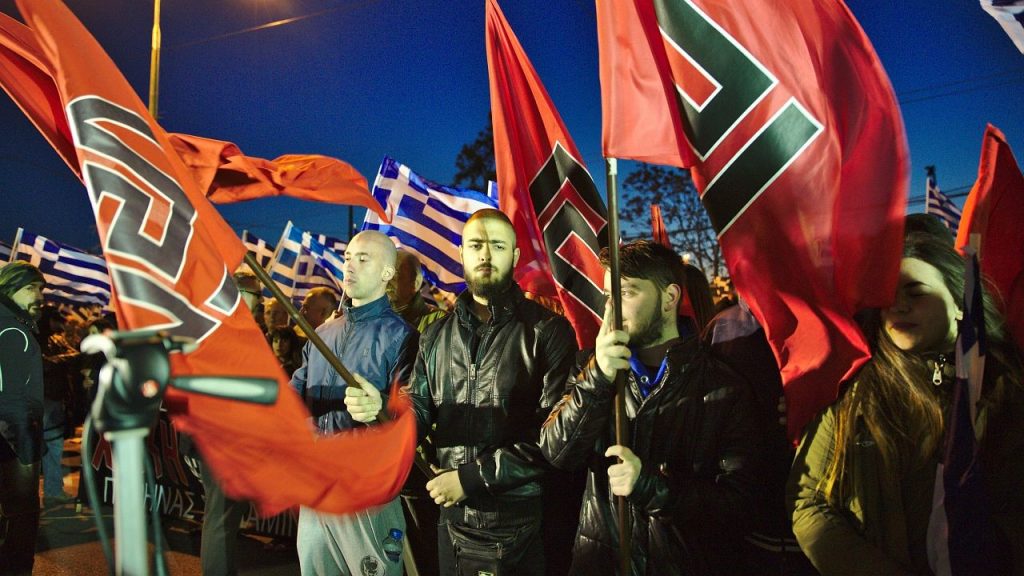Yesterday (7 October 2020), after a monumental 5-year-long trial, it was announced that 68 members of the Greek Neo-Nazi party Golden Dawn have been sentenced for a multitude of criminal offences.
In total, there were four offences: organised crime, the murder of anti-fascist rapper Pavlos Fyssas (Killah P), the attempted murders of communist trade union leader Sotiris Poulikogiannis and of Egyptian fisherman Abouzid Embarak.
Amongst those sentenced were 18 former Golden Dawn MPs including party leader Nikos Michaloliakos. Michaloliakos himself was sentenced for leading a criminal organisation.
Golden Dawn was founded as a Neo-Nazi organisation in 1985, later becoming a registered political party in 1993 after having received an increase of organisational support from the public.
Over the course of Greece’s decade-long financial crisis, Golden Dawn skyrocketed in popularity and managed to become the country’s third largest parliamentary party.
Alongside an abstracted Hellenic-styled swastika for the party symbol, Golden Dawn are undeniably Neo-Nazis. Working to inflict terror upon immigrants, the labour movement and antifascists with their “battalion squads” and achieving electoral successes through the party, it is not a long-shot to compare their tactics to those of the Nazis in 1930s Germany.
The trial itself was the largest trial against outright Nazis since the Nuremburg Trials.
Wednesday’s trial wasn’t the first large trial against fascists to have occurred in Greece however. After the fall of the Junta government in 1974, multiple officers who had been perpetrators in the 1967 military coup had been prosecuted.
Outside of the courthouse, stood a formidable 20,000-strong antifascist rally shouting “Fyssas lives, crush the Nazis“, physically defending themselves against oncoming fascists whilst also being attacked by the police with a water cannon and tear gas.
Amongst those attending the rally were the Communist Party of Greece (KKE) including their party leader Dimitris Koutsoumpas.
Around 2,000 police were deployed outside of the courthouse, blocking off the area with police busses and using heavy surveillance with drones and helicopters.
On top of the sentencing of former MPs, other party members and associates were convicted with a range of convictions from perjury to murder. Most of the charges were based on incidences of violent attacks in 2013.
Only 11 of the 68 defendants were present in the courtroom, with the rest represented by their lawyers. None of the former Golden Dawn MPs were present in court.
The legal defence team for Golden Dawn contained 50 lawyers. Despite initially having a massive defence witness list of 240 people, due to witness incriminations, this list had shrunk to 70.
During the course of the trial, the state prosecutor had accrued controversy for recommending that everyone other than the murderer of Pavlos Fyssas and those who had attempted to murder Abouzid Embarak and Sotiris Poulikogiannis be acquitted.
The state prosecutor even argued for the acquittal of those from Golden Dawn who had held down Fyssas whilst he was being stabbed to death.
The verdict of the case had a lot resting on it. If all of the defendants were acquitted, Golden Dawn would have received €8 million of state funds for their party that had been withheld for seven years since the investigation against them had been initiated.
Out of the verdict, it was stated that members of Golden Dawn convicted of leading a criminal organization face up to 15 years in prison, and those convicted of participating in the crimes face up to 10 years. 51-year-old Giorgos Roupakis who murdered Fyssas was handed a life sentence.
As Communists, in addition to celebrating the final blow to a Neo-Nazi party, we should also be sceptical to an extent about the verdict of this case and its implications for the future. Although this has in essence incapacitated Golden Dawn as a Neo-Nazi force, it is only the proletarian masses as opposed to the bourgeois state machine that can truly stamp out fascism.
Greece’s New Democracy government is a conservative one after all and only last year ordered the brutal clearance of Athens’ heavily squatted and antifascist Exarcheia neighbourhood that had become a refuge for refugees. Cladded with riot shields and tear gas, violently evicting squatters, the government’s police force clearly demonstrated their views against the radical left.
As history has shown with the banning of the Communist Party of Greece (KKE) in 1936 and later during the Junta military government between 1967-74, there is nothing to say that the Greek government nowadays couldn’t ban antifascist or communist groups and imprison their members.
In celebrating the decline of Golden Dawn, we must even more emphatically celebrate the widespread efforts of the Greek antifascists who have been risking their lives confronting the Golden Dawn “battalion squads” in the streets of Greece with successful victories in doing so.
Tomasz Nowak




